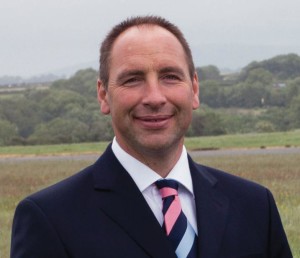 JAMIE ADAMS is confident and well-briefed – if a little tired after a night looking after his young twins.
JAMIE ADAMS is confident and well-briefed – if a little tired after a night looking after his young twins.
Discussing the Welsh Government’s plans to scrap smaller authorities and merge them he offers a robust critique and criticism of Cardiff Bay’s plans. “While the process has been going on for some time, it seems like the Welsh Government has now come to a snap decision. Very often the justification for it is the fact that they consider small authorities are unable to meet their statutory obligation.
The First Minister has pointed out that six authorities have been in special measures. But the credibility of his position is somewhat undermined by the recent good news in Pembrokeshire and also in Anglesey and Rhondda Cynon Taf. “The obvious person to consult with when you are considering change is the person affected by the changes you propose. The Welsh Government has set out its stall and its aspiration. I do not for one minute think that is the finished article. The Welsh Government will have to give evidence to justify its position. “With respect, the Welsh Government has to understand the pressures and complexities of local government. I pay tribute to the staff of local government who deliver critical services to the people of their counties.
Against that, I set the fact that apart from a few direct services, such as the Trunk Road Agency, the Welsh Government delivers no direct services. If you take an overarching view like the WG has done, it is difficult to understand the detail of the processes you are trying to change. “The Welsh Government has a tendency to categorise councils in one of two ways. We are badged as a rural authority but we have pockets of urbanization and real deprivation. Nevertheless we are obliged to deliver services over a wide geographical area.
The details of service delivery are not well understood by Welsh Government.” And in Pembrokeshire? “Pembrokeshire is unique in many ways and we are often accused by the WG of being different. I don’t mind being different. We are very resilient as a county and as a people. We have a sense of community spirit and identity that is second to none. “I would fight in the last ditch for Pembrokeshire.
I believe we have the ability and talent within this authority and within Pembrokeshire to deliver local services for Pembrokeshire. We have had a glowing report from the Wales Audit Office on our progress and performance this year, education is moving forward. “But it is not only about the administrative side of things, this Council. It is something more than that. The brand of Pembrokeshire, for tourism, business, agriculture and produce is extremely strong. In most parts of the UK the Pembrokeshire name is synonymous with those and it is hard to think of another county with such a strong brand identity.” Is Williams a challenge to local democracy? “The proposal from Welsh Government does not include a proposal for district councils and there is a danger of making decision-making too remote from the people we serve.
There would be real issues with that. Look at newspapers, for example, if the decisions are made miles away how are you going to be able to hold the decision-makers to account? “We have sixty councillors who are out, about and contactable within their communities. They can be held to account. There is a considerable advantage to the fact that if you make a decision you believe to be right but is unpopular then you can be voted out. So, if I thought I did the right thing and lost an election, I would not be delighted but I could at least say that I did the right thing as I saw it. “But many professional politicians are in the position that they want to cling to their livelihoods.
We have an increasing number of democratic representatives who have not worked outside of politics and they are remote from those they represent. Increasing numbers of Assembly Members in Cardiff Bay is something we need to be wary. I question the need for additional assembly members. “Having said that, there are in my opinion too many county councillors. It was very strange thing to go so far down the process of re-assessing the number of county councillors and then changing direction. Discussing the complexities of local government funding, Jamie Adams believes that economies can be made by reducing bureaucracy: “My outlook is simple.
I want to deliver the best services we can within the budget we have. “There is a need for the process of funding services to be streamlined by the Welsh Government. There are around 120 grants for education from the Welsh Government. Now those schemes may have been set up with the best of intentions, but it increases the burden of bureaucracy. You have people in councils applying for these grants and another tier of people at the Welsh Government administering them.
So much of the funding that should flow down is instead being filtered down and sticking to the sides. “Local Government is far better placed to understand the needs of their communities and address those needs as we can provide a little bit of initiative or entrepreneurship rather than just follow a prescription from Cardiff Bay. In a way, I am frustrated by what can appear like box-ticking, but I know there have to be checks and balances to ensure we provide value for money. “The relationship with Welsh Government must be developed to build trust to allow them to consider more bespoke ways of delivering services with the funding provided.
The governance arrangements could be simplified. The simplification can begin between the WG and us, and the WAO could oversee and verify the process to ensure our services are continually improving.” Addressing the challenge of potential further administrative upheaval, Jamie Adams responds: “I think Williams has been a long time in the coming from Welsh Labour. It is a reaction to some very disappointing results for Labour in 2008’s elections. We are now in a different place in the local government family.
We don’t have that many disagreements, really and Labour functions in coalition in councils across Wales. “The proof of the pudding is the fact that no other parties in the Welsh Government are signing up to Williams. It is untested that Welsh Labour’s proposals will either improve services or reduce costs. And I am not convinced that it is best to sign up to a process that can show neither of those things. “That said, I am not afraid of change. I am very relaxed that in the future a council such as Pembrokeshire will not provide all of the services we do at the moment. But in terms of being held to account for their delivery, you have to have a touchable, reachable democratic body. As a council, perhaps we do not need all the tools in the box.
Greater fluidity about service delivery might be a way of reducing costs or delivering them more efficiently. “We already work in consortia with other councils to support improvements in our schools. We work on support and challenge with Carmarthenshire for our schools and we are already grouping together with five other counties within ERW, the regional education authority. We are already working together. But strangely, the Welsh Government broke down the transport service back to individual authorities and that seems inconsistent with what it is now saying about wanting to join things together to save money.
“It’s a very difficult thing to resolve as no evidence has been put forward to support what is simply an assertion made by the WG. The Williams Report provides NO cost/benefit analysis for anything and to proceed without it is pure folly. It grabs the headlines to reduce the number of CEO’s. As an easy sell, what could be better? But it is an argument that is not followed through. With Dyfed previously we ended up with a lot of substructures and increased bureaucracy and any savings could be swallowed up by that factor.
“Looking at Williams: we are potentially facing a 9 to 12% rise in Council Tax depending on whether we are merged with Ceredigion or a reconstituted Dyfed. People in Pembrokeshire are worried about the potential rise in Council Tax and do not see why they should pay more for their services. And I agree with them.” Looking at the number of controversies involving it, is Pembrokeshire County Council worth saving? “I appreciate that people are frustrated with what is reported in the papers about the Council. Some of our problems have arisen from the way we have dealt with issues in the past and a lot of them have arisen from the last term of council. “In terms of the evidence, I can say look where we were in 2012 and where we are now.
We have had a great outcome from Estyn and a very positive annual assessment from the WAO. We have renewed confidence in our governance arrangements and in scrutiny to hold the executive to account. “We have the ability to plan for the future. In that future, we will not look as we do now. We will have to change to reflect the cuts in budgets that are likely to continue for some time ahead. But in terms of our ability to deliver good quality services, we are beyond a doubt well placed to do that. “Where we have to work hard is to develop trust amongst ourselves: between councillors and officers and amongst councillors. We have to ensure our focus is on managing the budget, delivering services and not scoring political points for the sake of it. With that in mind, I am confident for the future of Pembrokeshire.”

















Add Comment